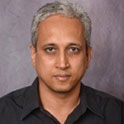2019 Conference
The Institute for Mind and Brain at the University of South Carolina held a one-day
conference on the Executive Function in Mind & Brain, Friday, March 1, 2019. It was
the third in a series of regular forums for highlighting current topics in cognitive
neuroscience. The conference featured three featured presentations, as well as invited
contributions by local researchers and a poster session.
Executive Function in Mind & Brain
Executive functioning refers to cognitive processes involved in managing the mental
resources necessary to achieve goals and function adaptively in the environment. These
higher order cognitive processes generally require effortful control of attention
to direct planning, self-monitoring, inhibition, emotional control, initiation of
action and flexible use of working memory. Prefrontal cortex and frontal lobe functioning
have proven to be key determinants of effective executive functioning. Executive function
follows a developmental time course as it grows in childhood and declines in later
life. Given its critical role for self-sufficient human functioning, a better understanding
of the determinants and consequences of executive function is essential in the study
of mind and brain.
The one-day conference invited students and faculty to consider several fundamental
questions. What are the brain bases of executive control? Can executive function be
improved with training or by other means? How does language impact executive function
and conversely how does executive function impact language? What are the risk factors
for decline in executive control?
Featured Speakers

Sharon L. Thompson-Schill, Ph.D.
Christopher H. Browne Distinguished Professor of PsychologyDirector, MindCORE Professor
and Chair of PsychologyUniversity of Pennsylvania
Dr. Thompson-Schill studies the biological bases of human cognitive systems, including
perception, memory, language and cognitive control. Her research has explored the
functions of the frontal lobe in the regulation of thought and behavior, especially
in relation to language and memory processes. Her research employs a wide array of
behavioral and neuroscientific methods with both typical and atypical populations,
including fMRI, lesion-deficit mapping of neurological patients, TMS, genotypic analysis
for typical variation, and eyetracking.

Mark D'Esposito, MD
Professor of Neuroscience and PsychologyDirector, Henry H. Wheeler, Jr. Brain Imaging
CenterUniversity of California, Berkeley
Dr. Mark T. D’Esposito studies the neural bases of high-level cognitive processes
such as working memory and executive control. Using a neuroimaging technology, his
research lab has identified neuroanatomical substrates and temporal dynamics of various
cognitive processes supported by prefrontal cortex. His lab has used pharmacological
methods to investigate the role of the dopaminergic system in working memory and frontal
lobe function. He has used behavioral and other methodologies to better understand
prefrontal function in patient populations and in normal aging.

Ellen Bialystok, OC, PhD, FRSC
Distinguished Research ProfessorWalter Gordon York Research Chair in Lifespan Cognitive
DevelopmentYork University
Dr. Bialystok’s research has used behavioral and neuroimaging methods to examine the
effect of bilingualism on cognitive processes across the lifespan. Major findings
from her work include the identification of differences in the development of essential
cognitive and language abilities for bilingual children, the use of different brain
networks by monolingual and bilingual young adults performing simple conflict tasks,
and the postponement of symptoms of dementia in bilingual older adults. Her research
raises the possibility that bilingualism contributes to cognitive reserve, which is
associated with a delay in the onset of symptoms of dementia.
USC Speakers

Rutvik H. Desai
Professor of PsychologyCollege of Arts and SciencesUniversity of South Carolina
Dr. Desai investigates the neural basis of representation of meanings of words and
sentences, in both healthy and neurologically impaired populations. His lab investigates
topics such as involvement of sensory motor systems of the brain in representing concepts,
similarities and differences in processing varieties of concepts including abstract
ones, processing of language, and brain basis of metaphor understanding. He uses function
MRI, transcranial magnetic stimulation, and behavioral studies of patients and healthy
individuals to address these issues.

Robert Davis Moore, MS, Ph.D.
Assistant Professor of Exercise ScienceArnold School of Public HealthUniversity of
South Carolina
Dr. Moore uses a variety of psychophysiological, behavioral, and clinical measures
to investigate the short- and long-term outcomes of concussive injuries. His research
on concussion focuses on 1) creating more comprehensive and sensitive assessment protocols;
2) identifying factors that moderate injury outcomes; and 3) developing active rehabilitation
protocols for post-concussion syndrome. Dr. Moore’s secondary line of research focuses
on the influence of health factors such as physical activity, fitness, and obesity
on neuropsychological health.




